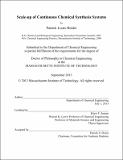| dc.contributor.advisor | Klavs F. Jensen. | en_US |
| dc.contributor.author | Heider, Patrick Louis | en_US |
| dc.contributor.other | Massachusetts Institute of Technology. Department of Chemical Engineering. | en_US |
| dc.date.accessioned | 2014-05-08T13:59:52Z | |
| dc.date.available | 2014-05-08T13:59:52Z | |
| dc.date.copyright | 2013 | en_US |
| dc.date.issued | 2013 | en_US |
| dc.identifier.uri | http://hdl.handle.net/1721.1/86870 | |
| dc.description | Thesis: Ph. D., Massachusetts Institute of Technology, Department of Chemical Engineering, 2013. | en_US |
| dc.description | This electronic version was submitted by the student author. The certified thesis is available in the Institute Archives and Special Collections. | en_US |
| dc.description | Cataloged from student-submitted PDF version of thesis. | en_US |
| dc.description | Includes bibliographical references (pages 72-80). | en_US |
| dc.description.abstract | Continuous flow systems for chemical synthesis have become increasingly important in the pharmaceutical and fine chemical industry in the past decade. Initially, this work was confined primarily to microfluidic systems, but recently there has been a growing demand for milliscale systems capable of making material for clinical trials and pilot plant testing. The objective of this thesis is to demonstrate a practical system to accomplish continuous chemical synthesis within the context of a fully integrated pilot plant. The plant provided a platform to test scaled-up membrane-based liquid-liquid separators which were studied in detail. Previous work demonstrated the use of microfiltration membranes to separate liquid-liquid systems by leveraging the dominance of interfacial tension over gravity at small scales. When scaling up, it was determined that pressure control was critical to the operation of the separators. A pressure control module was designed and integrated into the separator device to provide the appropriate conditions to guarantee separation. The separators required no outside control to accomplish separation when connected to various downstream conditions including pumps, backpressure controllers, and other separators. This allowed for easy design and operation of multistep processes such as solvent swaps and countercurrent extraction. The main accomplishment covered in this thesis is the building and operation of an integrated continuous manufacturing plant for a small molecule pharmaceutical product (aliskiren tablets). An advanced intermediate was continuously processed through two synthetic steps with workup which are detailed here. The remainder of the process purified and formulated the drug substance and formed the final tablet which met many key performance criteria. This work opens avenues to look at even more complex liquid-liquid and even gas-liquid separation processes. Improved processes for continuous manufacturing which make use of recycling, multistage extraction, and novel chemistries can build on the research performed here to further improve synthesis systems. These results demonstrate that continuous processes are possible even for complex, industrially-relevant products. | en_US |
| dc.description.statementofresponsibility | by Patrick Louis Heider. | en_US |
| dc.format.extent | 102 pages | en_US |
| dc.language.iso | eng | en_US |
| dc.publisher | Massachusetts Institute of Technology | en_US |
| dc.rights | M.I.T. theses are protected by copyright. They may be viewed from this source for any purpose, but reproduction or distribution in any format is prohibited without written permission. See provided URL for inquiries about permission. | en_US |
| dc.rights.uri | http://dspace.mit.edu/handle/1721.1/7582 | en_US |
| dc.subject | Chemical Engineering. | en_US |
| dc.title | Scale-up of continuous chemical synthesis systems | en_US |
| dc.type | Thesis | en_US |
| dc.description.degree | Ph. D. | en_US |
| dc.contributor.department | Massachusetts Institute of Technology. Department of Chemical Engineering | |
| dc.identifier.oclc | 877964666 | en_US |
